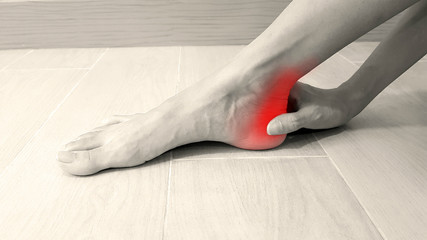Achilles Tendinopathy is the inflammation of the Achilles tendon after an injury. You might also hear it referred to as Achilles tendinitis, Achilles tendonitis or Achilles tendinosis.
Tendons are strong and fibrous connective tissue that connect your muscles to your bones. The Achilles tendon is the largest tendon in the body, connecting the calf muscle to the heel bone. This tendon is responsible for your foot being able to move up and down and any strain to this area may be the reason for recurring heel pain.
What causes Achilles Tendinopathy?
Repetitive strain or overuse
Achilles tendinopathy occurs when there is repetitive strain or overuse of the Achilles tendon. The tendon becomes inflamed and causes pain. The pain can be mild to severe preventing you from being able to do any more activities.
The injury can happen to anyone through overuse and putting the same pressure on the tendon on a regular basis, because of the nature of your work or sports activities. We find it’s common in sports people who may have suddenly increased the frequency and duration of their fitness programs. About 11% of all running injuries are Achilles tendinopathy.
It’s also common in middle aged people who play sports only on the weekends. If exercise is irregular, and the tendon hasn’t been conditioned to high intensity activity, playing a game of tennis or basketball on the weekends can stretch and tear the Achilles tendon.
Foot biomechanics
People with flat feet or feet that turn inwards are prone to Achilles Tendinopathy. Flatter foot arches can pull on the tendon, making it tight and prone to injury.
Incorrect footwear
Footwear that is loose with minimal support will cause the tendon to work harder to support the foot and keep the shoe on.
Being overweight
Carrying too much weight will place a heavier load on the Achilles tendon and make it work harder to keep mobile.
Not warming up before intense exercise
By not warming up and stretching before a bout of intense exercise, the Achilles tendons are more at risk of injury.
Symptoms of Achilles Tendinopathy
- Swelling and tenderness in the tendon
- Pain in the tendon or near the heel that is mild to severe
- Stiffness that eases with some warm up exercises
- Inability to bend the foot forward or stand on the toes
- If there is a severe tear in the tendon, it sounds like a popping noise when the injury occurs
Self-help – what you can do at home
If you get an injury while playing sports or any other activity, the very next step is to engage the RICE Method – Rest, Ice, Compression, Elevation.
Following this, we recommend you make an appointment and our podiatry team will assess the extent of the injury. Recovery of a torn Achilles tendon can be slow and it’s very important to take excellent care of the tendon during recovery. We’ll create put a treatment plan and give you exercises to do at home to strengthen and support your Achilles tendon to heal.
There are also things you can do at home to ease the pain of an Achilles injury and to prevent further damage:
- Reduce the intensity and duration of your exercise routines
- Gently stretch the calf muscles to ease the tension on the tendon
- Insert an orthotic into your shoe to take the pressure off the heal
- Make sure you do an adequate warm up and stretch before exercise
- For acute pain, apply ice and leave it for twenty minutes every couple of hours or less
How we help at our podiatry clinic (Adelaide, Mount Barker and Stirling)
Phone our podiatry clinic and make an appointment if you have any acute or chronic pain in your Achilles tendon. This tendon is the largest in the body and recovery can be slow, mainly because you are on your feet and actively using the tendon every day. Our gentle team of experienced podiatrists will help you with a recovery plan, to avoid further injury and to help you get back to your sporting activities.
Our podiatry team consults in Adelaide, Mount Barker and Stirling. Call us on one of the numbers below to make an appointment with us.
Sander Podiatry Adelaide – 08 8379 1456 (Greenhill Podiatry)
